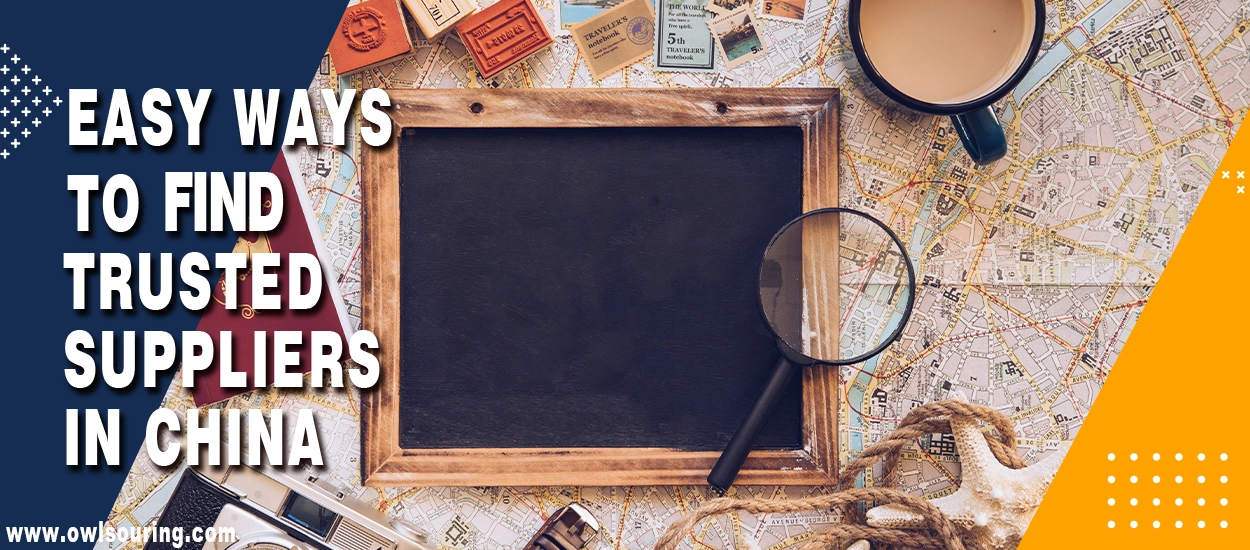The manufacturing industry in China is meeting worldwide demand. Wholesalers and merchants seeking high-quality items at affordable rates often go to China.
However, caution is essential when looking for reliable suppliers in China, as finding a factory alone isn’t sufficient.
You should follow specific steps to find trusted suppliers in China. This China supplier guide offers insight into finding reliable suppliers| Supplier Verification in China.
Understanding the Chinese Supplier Market
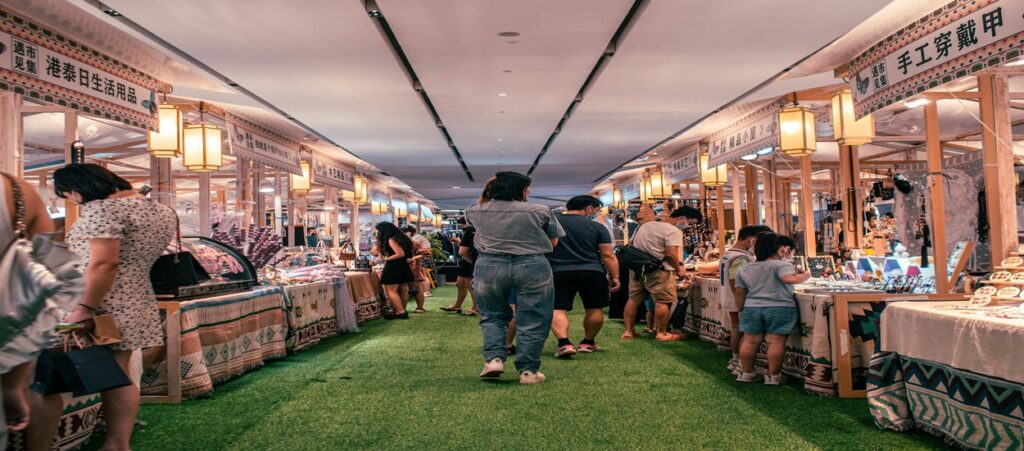
Here are some tips for understanding the Chinese supplier market:
1) Types of suppliers (manufacturers, trading companies, wholesalers)
Manufacturers play a direct role in the production process. Hence, they usually have the best prices. Recent industry surveys estimate China has over 3.7 million manufacturers. It accounts for 30% of global industrial production.
By 2030, the UN projects that China will account for 45% of global manufacturing value added (MVA), far away from the highest share held by a single country (Source).
Also, there are trading companies that connect buyers and sellers. Trading companies usually build ties with more than one factory. Wholesalers mainly deal with large amounts of finished goods.
They typically get goods from multiple Chinese suppliers or trading companies.
| Manufacturer Type | Description | Key Characteristics |
|---|---|---|
| OEM (Original Equipment Manufacturer) | Companies that produce components and parts for products made by other companies. Typically focused on B2B sales and manufacturing parts, not finished products. | – Specialises in parts, not finished products. – B2B focus. – Common in tech and automotive sectors. |
| ODM (Original Design Manufacturer) | Manufacturers take existing product designs and modify them (e.g., change colours, packaging, or components) to create a new branded product. Often seen as “private labellers.” | – Focus on branding and customisation. – Targets specific market needs. – Flexible designs and minor adjustments. |
| Contract Manufacturer | Manufacturers that produce products based on design specifications from other companies. Typically, the client retains intellectual property rights, while the CM focuses on the manufacturing process. | – Works based on the client’s product specs. – Produces products without owning the design. |
| Trading Company | Acts as an intermediary between manufacturers and buyers, specialising in understanding customer demand, import/export regulations, and streamlining communication. Often works with multiple manufacturers. | – Mediates between manufacturers and buyers. – Ensures smoother communication and trade logistics. – Offers lower prices due to bulk purchasing. |
| Manufacturers | Direct producers of goods for use or resale. They can offer lower prices but often require higher minimum order quantities. Typically sell directly to wholesalers or large suppliers. | – Can offer low prices for bulk orders. – High minimum order quantities. |
| Wholesalers | Companies that purchase large quantities of products from manufacturers and sell them in bulk at discounted rates. They typically deal with finished goods and have the resources to store large amounts. | – Specialises in bulk sales at a discounted price. – Requires capital and storage space. |
| Dropshippers | Sellers who don’t hold inventory but instead fulfil orders directly through third-party suppliers. They purchase items one at a time, often at higher prices, only paying once the product is sold. | – No upfront purchasing or inventory management. – Higher product costs due to single-item purchases. – Ideal for smaller operations. |
2) Industrial clusters and specialised regions
China has several industrial clusters and specialised regions. Many businesses in these regions work in related industries. Experts, suppliers, and skilled labourers form an ecosystem.
Statista said Chinese exports were about $307.85 billion in June 2024. Hence, it is easy to find Chinese manufacturing partners for exports in these regions.
3) The role of Guanxi (关系) in Chinese business culture
Guanxi means relationship. It is an essential idea in Chinese business culture. Also, it has a significant impact on how suppliers work with customers. It’s more than just networking; it includes duties, favours, and trust that grows over time.
Find reliable suppliers in China and build 关系 with them.
4) Impact of government policies on suppliers
The Chinese provider market is shaped in large part by government policies. These policies can have an impact on many areas of a business. Such regions include output prices, export rules, and industry standards.
For example, new environmental protection measures have led to tight production rules. China’s Belt and Road Initiative also creates new trade opportunities for suppliers.
Steps to Identify Reliable Suppliers in China
It is essential to find reliable suppliers in China. Getting your hands on reliable suppliers in China requires research and inquiries. The following can help you find a manufacturer in China:
1) Engage with sourcing agents or consultants
Getting help from China sourcing agents or consultants is vital. These experts know much about local industries, cultural nuances, and business practices.
They can help discover suppliers, screen them, and facilitate interaction. Global sourcing agents help companies find more reliable suppliers than themselves.
2) Define your product requirements
The easier it is to find a seller who can meet your needs, the more specific your needs must be. It includes details like the materials used, size, and quality standards.
Providing precise product standards may reduce quality issues by 60%.
3) Research potential suppliers
It is important to do proper research if you are looking for reliable suppliers in China. Check trade group databases, B2B sites, and industry listings.
Consider product quality and how long they’ve been in business. Also, look into their export experience. By taking these steps, you can find the best suppliers in China.
4) Attend trade shows and exhibitions
You can meet suppliers at trade events and displays. An estimated 25,000 suppliers attend events like the Canton Fair. There, you can make connections and compare sellers and product quality.
5) Utilise online B2B platforms
Online B2B sites are now crucial for connecting with reliable suppliers in China. Many Chinese wholesale websites have millions of ads for products from thousands of trusted suppliers. So it makes the China supplier search very easy.
These platforms often provide tools for supplier verification in China and secure payment options. About 60% of people who buy from other countries research online on B2B sites.
6) Conduct preliminary supplier screening
Once you have a list of possible suppliers, do a preliminary screening. It means reviewing their business accounts and ensuring they have the necessary licenses. It also includes judging how well they respond to conversation.
Initial screening can help eliminate people who aren’t a good fit.
Evaluating Supplier Credibility and Quality
Quality is vital to finding reliable suppliers in China. The following tips will help you figure out how trustworthy a supplier is:
1) Verify business licenses and certifications
Checking a supplier’s business licenses and certifications is vital. It means looking at their business license and tax papers.
According to new polls, about 15% of suppliers on big B2B sites have certifications that don’t match up. It shows how important it is to do thorough checks.
2) Check financial stability and production capacity
Always check a supplier’s financial security and production capacity. It could mean looking at their finances and getting to know their customers. It also includes judging their manufacturing capacity.
A seller with a favourable debt-to-equity ratio is financially secure.
3) Assess communication and responsiveness
Communication is vital in business relationships. Note how soon the merchant answers queries. Also, find out if they are ready to give you much information.
4) Review customer testimonials and references
References and customer reviews show a company’s reliability. Request references from the supplier and contact their past or current clients. Ask them about the product’s quality, delivery times, and after-sales support.
Online reviews and ratings on B2B platforms can also be helpful.
5) Conduct factory audits or site visits
If you can, do site visits or surveys of the factories. It helps to determine how trustworthy and skilled a supplier is. You can then judge their production infrastructure and quality control methods.
In addition, you will get a first-hand look at how they work.
However, this option may not be practical for some importers. They can hire someone to perform third-party quality inspections in China.
Key Platforms for Finding Chinese Suppliers
The internet has changed how people buy from China. Several online sites help make these connections easy and possible. Here are platforms for finding Chinese suppliers:
1) Alibaba
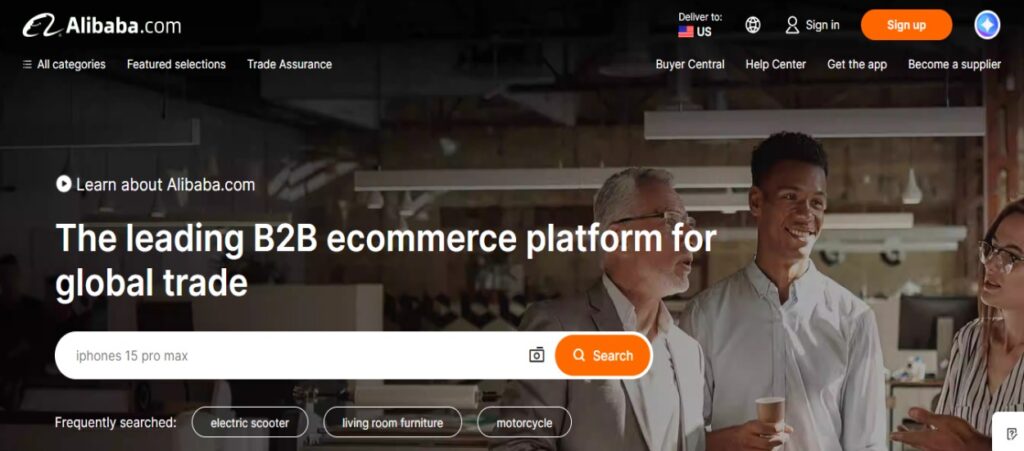
Alibaba is a prominent platform with over 10 million active sellers. Thus, you can easily find reliable suppliers in China. About 80% of foreigners buy from Alibaba at some point during sourcing.
There are about 190 million products in different categories. To build buyer trust, Alibaba offers features like supplier verification in China.
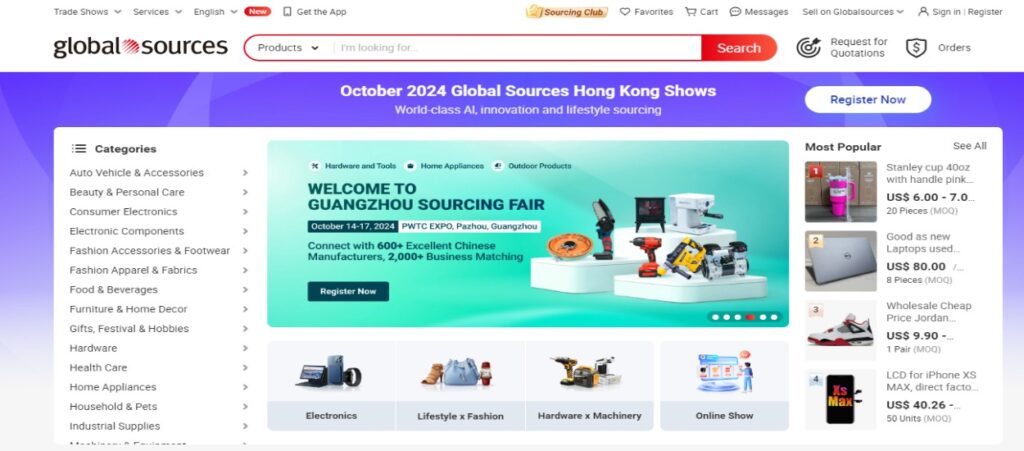
The Global Sources platform is prominent in B2B sourcing. The site has about 1.5 million items from more than 300,000 verified sellers. Global Sources is excellent for buying technology, fashion, and home items.
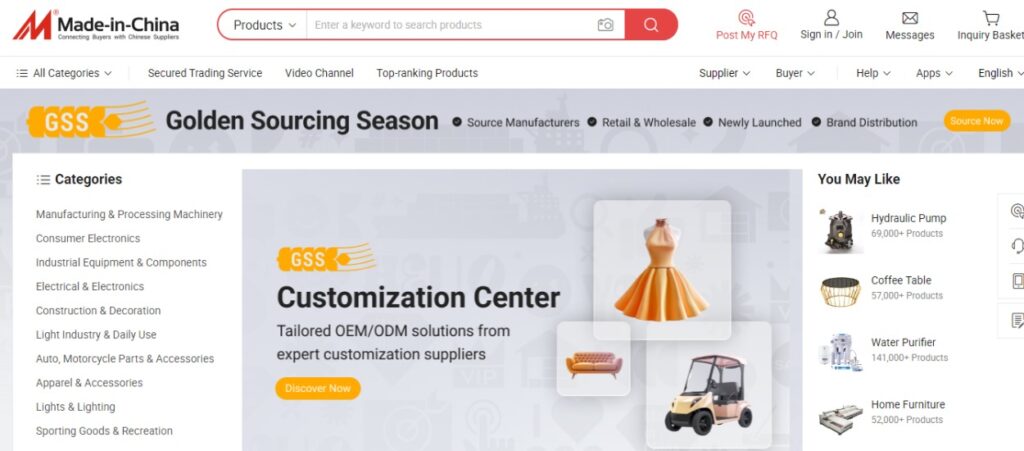
Made-in-China helps foreign buyers find China manufacturing partners and suppliers. About 40 million goods from 3 million various providers are on the marketplace. Made-in-China is known for having a strict process for verifying its suppliers.
4) DHgate
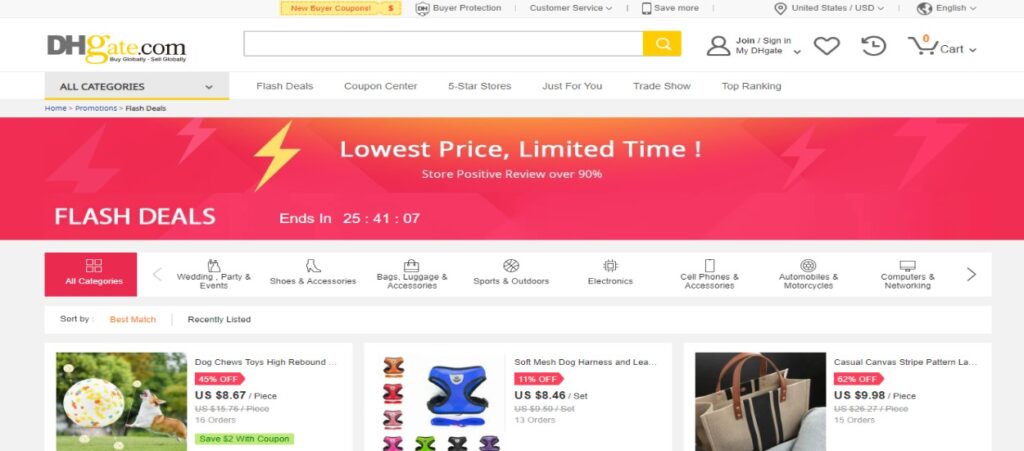
DHgate mainly connects international buyers with Chinese suppliers. Consumer items are advertised on DHgate by about 2 million merchants in over 30 million ads. Their buyer protection program on the site makes transactions even safer.
5) Canton Fair
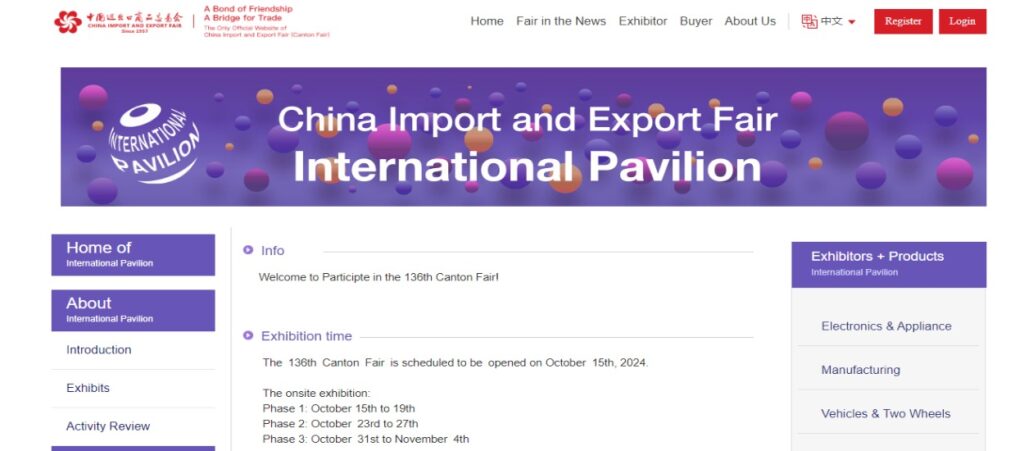
China’s biggest trade show is the Canton Fair. It has an online platform to go along with its real-life event. Canton Fair Online gives you access to thousands of Chinese suppliers.
Sellers from the Yiwu market and other regions regularly show up at the fair all year long. Also, such trade fairs in China let users communicate with suppliers in real-time.
Comparison List of Chinese Wholesale Suppliers
| Supplier | Website | Overview | Key Features |
|---|---|---|---|
| PapaChina | https://www.papachina.com | For 17+ years, PapaChina has been a leading source of promotional products worldwide, offering an extensive range of custom items, including office supplies, branded apparel, and tech gadgets, at highly competitive prices. | – Ideal for promotional events like trade shows and exhibitions – Secure payment options and timely delivery – Serves retailers, wholesalers, distributors, and advertising agencies globally |
| Chinavasion | https://www.chinavasion.com/ | Specialises in electronics for B2B and B2C markets, providing bulk-priced gadgets, commercial appliances, and industrial tools with stringent quality control. | – Established in 2004 – Own manufacturing unit – Focus on electronics with custom branding options – Quality assurance through supplier reviews and inspections |
| HTDC | https://www.hktdc.com/ | A trusted platform for sourcing wholesale products with a simple user interface, suitable for startups, SMEs, and corporates. Offers low MOQs to encourage global trade participation. | – Represents businesses at trade shows and conventions – Based in Hong Kong, Asia’s trade fair hub – Supports faster global trade connections |
| Trade Key | https://www.tradekey.com/ | A global B2B marketplace connecting SMEs and entrepreneurs to worldwide markets. Known for live buyer and seller updates and a wide product category range, including apparel, beauty, and computer hardware. | – Live buyer and seller feeds – Quality analysis and supplier verification – Empowers businesses with global visibility |
| DIYTrade | https://www.diytrade.com/ | A major B2B platform offering over 5 million customizable promotional products across diverse categories such as office supplies, transportation, and security items. | – Formerly known as eBig China – Specialises in customised industry-specific products – Suitable for bulk purchases |
| Gearbest | https://gearbest.net/ | Focuses on electronics, appliances, and accessories with free shipping for orders over $40. It provides drop shipping services and competitive bulk pricing for businesses. | – Established in 2013 – Free international shipping via China Post or Hong Kong Post – Specialises in electronics and apparel |
| 1688.com | https://www.1688.com/ | A domestic B2B marketplace under the Alibaba Group catering to Chinese businesses. Offers the lowest prices for bulk orders and connects buyers with manufacturers directly. | – Comprehensive product catalogue – Requires language translation for non-Chinese speakers – Known for low prices, but involves language and payment security challenges |
| Yiwugo | https://www.yiwugo.com/ | The official website for Yiwu Trade Market features over 75,000 stores and specialises in small-value items like jewellery, toys, and office supplies. | – Supports OEM, ODM, and OBM customisation – Multiple payment and shipment methods – Walk-through market experience available |
| Banggood | https://www.banggood.com/ | Known for its extensive warehouse network and discount programs, Banggood provides cost-effective drop shipping services and integrates with platforms like Shopify and eBay. | – 100+ Chinese warehouses and 37+ international warehouses – API integration for e-commerce platforms – Wide product selection, including industrial tools and health products |
| Lightinthebox | https://www.lightinthebox.com/ | A business-to-customer dropshipping platform offering responsive customer service and bulk order options. Focuses on negotiated pricing and fast delivery. | – Trusted for bulk orders – Flash sales and discounts available – Highly user-friendly interface |
| SupDropshipping | https://www.supdropshipping.com/ | Specialises in Amazon and eBay drop shipping with additional services like quality inspections, custom packaging, and product photography. | – Global warehouse network – No fixed MOQ requirements – Integration with Shopify and multiple payment methods |
If you didn’t find exactly what you were looking for, don’t worry. As sourcing professionals, we specialize in finding the best suppliers according to the needs of the customer’s business. Just contact us, and we will try to find the ideal solution for you!
Questions to Ask Potential Suppliers in China
Asking questions will help you figure out quality suppliers in China who are a good fit.
1) Minimum order quantities (MOQ)
If you run a new business or are trying out new goods, knowing a supplier’s MOQ is crucial. You cannot just find a low MOQ Alibaba supplier and start sourcing.
MOQs can vary significantly between suppliers and products. Some suppliers might be open to reducing MOQs. It can apply if you want to work with them for a long time. For most consumer goods, the units can be lower and vice versa.
2) Production lead times
Know production lead times to arrange inventories and satisfy customers’ demands. Chinese vendors often have 30-90-day lead periods. However, this depends on the complexity of the industry, product, and order size.
3) Quality control processes
Know how a company handles quality control to ensure product quality stays the same. Talk to them about their quality control steps at different stages of production. Learn whether they have quality control certifications.
Remember, performing quality control in China is a necessary step in the sourcing process.
4) Customisation capabilities
Before you buy from a seller, you should find out if they produce custom products. Ask if they offer design services and the MOQ for personalised orders.
Discover if there are any extra fees for customisation. Ask them if they’ve dealt with similar requests for customisation before. Then, inquire how they make and approve samples.
5) Export experience and certifications
A supplier’s export expertise and certifications can impact transaction ease. Ask them if they have exported to your country or area before.
Inquire if they know what paperwork is needed and if they have export licenses. Also, find out what licenses are required for your type of product and market.
6) Payment terms and methods
How and when a dealer accepts payments can help you track cash flow and assess financial risks. What are their standard payment terms? Do they offer credit terms for customers who have bought from them before?
You should choose the best way to pay Chinese suppliers. Also, determine how deposits and balance payments are handled.
In the other article, we discuss “How to Send Money to China?” Don’t miss it.
7) Filing a Complaint Against a Chinese Supplier
If you are in a conflict with a Chinese supplier, the first step is to collect all supportive papers — contracts, letters, invoices, and payment proofs. Wherever possible, attempt to resolve the issue directly through constructive dialogue. Most disputes result from miscommunication and are often resolved without escalation.
If talks do not prove productive, you may have to officially register a complaint through authorised channels such as econsumer.gov, Made-in-China.com, or business dispute resolution websites. Although bodies such as the Better Business Bureau can offer counsel, these agencies are not empowered in overseas cases.
In dire cases, legal proceedings would be the way forward. This could involve the engagement of a foreign trade lawyer or proceedings through arbitration or the Chinese courts — something best navigated with the assistance of local lawyers.
For detailed steps and strategic guidance, see our article: “How to File a Complaint Against a Chinese Supplier.”
Read More:
- How to Find a Reliable Manufacturer in China?
- Top Chinese Wholesale Websites to Buy from China
- Alibaba Alternatives: 12 Sites Like Alibaba to Source
- How To Buy Wholesale From China?
Final Thoughts!
To use the Chinese supplier market, you need solid research. It can be hard to find reliable suppliers in China. A China supplier directory helps firms source Chinese goods. It helps to maximise the country’s substantial industrial potential and cheap prices.
As you start your China supplier search, don’t forget to build strong and long-term ties. You might face several difficulties in the beginning. But with the China sourcing tips above, you can deal with the challenges.
Our team is always ready to help you find China vendors. OwlSourcing has everything that it takes to import from China.

